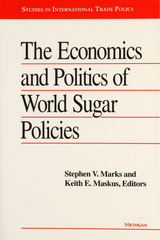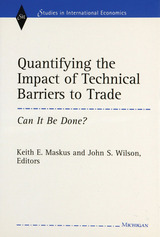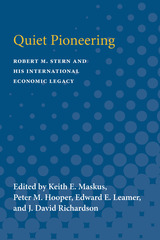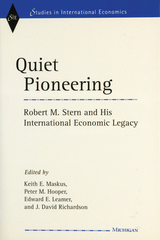4 books about Maskus, Keith E.

Economics and Politics of World Sugar Policies
Stephen V. Marks and Keith E. Maskus, Editors
University of Michigan Press, 1993
Around the world, markets for producing and consuming sugar and related sweeteners are heavily distorted by trade barriers, output controls, price supports, and government subsidies. These policies have significant and identifiable impacts on the economic well-being of different groups in various countries. The net effect of these global distortions is to damage world welfare at the same time that the various national policies reduce economic well-being in the countries that impose them. Sugar policy is the perfect example of how the political imperatives of support for agricultural interests dominate considerations of national welfare or international relations. The contributors provide rigorous analyses of world sugar markets and the distortions caused by policies tn the major countries. They employ several numerical modeling techniques to describe and assess the impacts of world sugar programs. These calculations are buttressed by complementary discussions of the political and economic rationales underlying sugar protection and support. The contributions to The Economics and Politics of World Sugar Policies combine survey evidence with new modeling results from econometric approaches and applied equilibrium simulations to provide new assessments of the current state of world sugar markets. Several original results are presented that shed new light on the impacts of sugar protection. This book should be of considerable interest to agricultural economists, trade-policy analysts, and specialists in international relations and development economics. It is highly relevant for understanding both the economics of agricultural protection and the politics of farm support.
[more]

Quantifying the Impact of Technical Barriers to Trade
Can It Be Done?
Keith E. Maskus and John S. Wilson, Editors
University of Michigan Press, 2001
This book provides an up-to-date discussion of economic issues involved in analyzing regulations of product quality and performance in international trade. Among the issues addressed in this collection are restrictions on genetically modified foods and pesticide use and compatibility standards for computers. While such regulations may serve important goals, they may also interfere with international trade flow by raising the costs of compliance. This is of special concern to developing countries, which have found it difficult to meet the increasingly exacting regulations imposed by the United States and Europe. Keith E. Maskus and John S. Wilson gather prominent international trade specialists to ask whether the impacts of such regulations may be quantified systematically in order to inform the international policy debate. The essays included here cover all fronts of the debate over regulatory issues and trade conflicts. The discussion ranges from a review of how trade conflicts emerge and how they are managed by the international trading system to a technical analysis of the potential impact of European restraints on trade in genetically modified products to an examination of methods for estimating the costs of compliance with environmental regulations. Considerable attention is paid to whether the emergence and enforcement of stronger standards among developed economies could result in diminished trade opportunities for developing countries. At the same time, the possibility that standards could expand market access through resolving consumer information problems is analyzed. This book will appeal to international economists, international relations specialists, and individuals concerned about appropriate regulation of safety and health issues in the global economy. Keith E. Maskus is Professor of Economics, University of Colorado, Boulder. John S. Wilson is Lead Economist, Development Economics Research Group, The World Bank.
[more]

Quiet Pioneering
Robert M. Stern and His International Economic Legacy
Edited by Keith E. Maskus, Peter M. Hooper, Edward E. Leamer and J. David Richardson
University of Michigan Press, 1998
New scholarly research in important aspects of international economics is brought together in this volume. The unifying theme is that each chapter is devoted to a fresh analysis of a problem in international economics that had earlier received cogent and prescient attention by Professor Robert Stern of the University of Michigan, one of the major figures in international economic research in the second half of the twentieth century. Each chapter examines a significant issue in international trade or finance, including determinants of comparative advantage, the effects of trade restrictions and the importance of trade liberalization, aspects of international trade institutions, and monetary policy in integrated markets. Three broad areas of international economic analysis are explored. The first part of the volume is devoted to new and sophisticated empirical analyses of important policy questions, such as technical change in trade models, how nontariff barriers are established, and how patent protection affects trade flows. The second part analyzes key areas involving international trade negotiations, including the usefulness of binding tariff commitments, regionalism versus bilateralism in trade liberalization, and strategic competition among international firms in setting negotiating agendas. The final part considers important questions in labor costs, asset pricing, and monetary union in international markets. Professional international economists will find much worth reading in the volume. It also is relevant to those who study international relations and international organizations; political scientists; and government policy analysts. Keith E. Maskus is Professor of Economics, University of Colorado, Boulder. Peter M. Hooper is Assistant Director, Division of International Finance, Board of Governors of the Federal Reserve System. Edward E. Leamer is Professor of Economics and Management, University of California, Los Angeles. J. David Richardson is Professor of Economics, Syracuse University.
[more]

Quiet Pioneering
Robert M. Stern and His International Economic Legacy
Keith E. Maskus, Peter M. Hooper, Edward E. Leamer, and J. David Richardson, Editors
University of Michigan Press, 1997
New scholarly research in important aspects of international economics is brought together in this volume. The unifying theme is that each chapter is devoted to a fresh analysis of a problem in international economics that had earlier received cogent and prescient attention by Professor Robert Stern of the University of Michigan, one of the major figures in international economic research in the second half of the twentieth century. Each chapter examines a significant issue in international trade or finance, including determinants of comparative advantage, the effects of trade restrictions and the importance of trade liberalization, aspects of international trade institutions, and monetary policy in integrated markets. Three broad areas of international economic analysis are explored. The first part of the volume is devoted to new and sophisticated empirical analyses of important policy questions, such as technical change in trade models, how nontariff barriers are established, and how patent protection affects trade flows. The second part analyzes key areas involving international trade negotiations, including the usefulness of binding tariff commitments, regionalism versus bilateralism in trade liberalization, and strategic competition among international firms in setting negotiating agendas. The final part considers important questions in labor costs, asset pricing, and monetary union in international markets. Professional international economists will find much worth reading in the volume. It also is relevant to those who study international relations and international organizations; political scientists; and government policy analysts. Keith E. Maskus is Professor of Economics, University of Colorado, Boulder. Peter M. Hooper is Assistant Director, Division of International Finance, Board of Governors of the Federal Reserve System. Edward E. Leamer is Professor of Economics and Management, University of California, Los Angeles. J. David Richardson is Professor of Economics, Syracuse University.
[more]
READERS
Browse our collection.
PUBLISHERS
See BiblioVault's publisher services.
STUDENT SERVICES
Files for college accessibility offices.
UChicago Accessibility Resources
home | accessibility | search | about | contact us
BiblioVault ® 2001 - 2025
The University of Chicago Press









